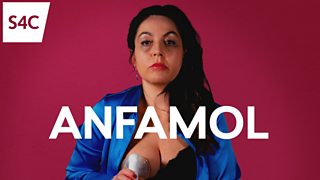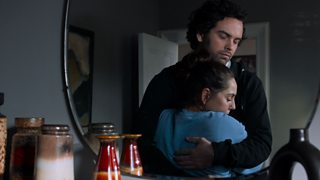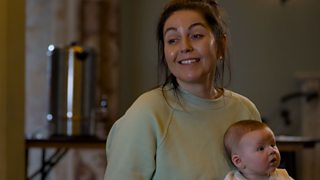Writer Rhiannon Boyle introduces her new series Anfamol for S4C. Anfamol (aka Unmotherly), is an unfinchingly honest drama about an electively single mother and the reality of parenthood.
Can you introduce yourself and your series Anfamol?
My name is Rhiannon Boyle and I’m the Writer, Series Creator and Creative Producer of the Welsh language comedy drama Anfamol produced by , which is an honest, hilarious and heartbreaking story about the reality of being a modern mother.
Tell us about the lead character in Anfamol, Ani ()
Ani is a strong, self-sufficient, successful, single feminist who has a seemingly perfect life. However, she has a very fractured relationship with her dysfunctional family. In the hope of filling a void inside her and finding unconditional love she decides to have a baby on her own by buying sperm for a sperm bank.

Anfamol (Credit: S4C)
What compelled you to tell this story?
A few years back a friend of a friend had a baby this way. She told me when she was choosing the donor on the sperm bank’s website she’d gone through dozens of profiles of men. You get pages of data including - hair and eye colour, height, weight, temperament, hobbies, IQ, medical history, family’s medical history, handwriting, a voice recording, baby pictures - the lot! I found this fascinating. I did some research and interviewed some women who’d had a baby this way. One thing they all had in common is that they were fierce, badass and strong. I wanted to create a character that would embody these inspirational modern women.

(Credit: S4C)
What motivated you to write Anfamol? Were you particularly inspired/influenced by anything/anyone?
During the pandemic I was asked to pitch an idea to the theatre company and so I pitched this story - a forty-year-old woman surrounded by couples and families at her little sister’s wedding who starts feeling like a fish out of water and succumbs to societal pressures to have a child. She puts her heart, soul and all her savings into it, only to find that motherhood was not quite what she expected.
Anfamol was first performed at the , can you tell us how you found adapting your play for TV? Did you ever envisage that Anfamol could be a TV series?
I never thought it would be a TV series. I got lucky when the Drama Commissioner came to see the play in and loved it. At the time I was working as a writer for the Welsh continuing drama Pobol y Cwm and one of the producers, who’d also seen the play, approached me and said she’d had a conversation with the commissioner about the show. She asked if I wanted to work with the team and develop the stage show into a TV series. It didn’t feel real to be honest. It felt like a dream. As a writer you have lots of promising conversations like this and most of them never come to anything, so I tried not to get too excited. And then a few months later my contract was signed, and we were in development.

(Credit: S4C)
What steps did you take adapting it from stage to screen?
The monologue was an hour and a quarter so what we found when we tried to stretch the original narrative over five half hour episodes was that there wasn’t enough story. So, we had to add new characters and new strands. That was hard, because the new bits couldn’t feel like add ons; they had to suit the world and be relevant to the themes.
It was so much fun bringing all the characters to life in the script. In the monologue we only get Ani’s version of all the characters but suddenly, they were fully rounded, three-dimensional beings inhabiting the world. Because Ani talks to the audience in the play, I wanted to keep that element of breaking the fourth wall, but it was tricky to work out who she’s talking to and why and to perfectly balance the ‘to cameras’ throughout the episodes. One huge change was moving the story from 2020 to the present day. In the play Ani tries to escape motherhood by going back to work but then lockdown hits and sends her into a deep loneliness and isolated state. We thought setting the TV show during the pandemic would be a bit stale, so it was about finding another situation to give us that total isolation, which I think we managed to do.
Anfamol was the first full-length Welsh-language play to be staged in front of a live audience after the pandemic, how do you find writing in two languages? Do you prefer writing in one over the other?
I’m a half Welsh, half English mongrel and I grew up in a fully bilingual family and home. My husband is also a non-Welsh speaker. My kids go to Welsh language school, so we speak Welsh, but when my husband’s around we switch to English (unless we don’t want him to know what we’re saying, that’s handy). Because of this I’m comfortable writing in both languages. In fact, I like mixing them up because that’s a true representation of the Wales we live in. That’s why Anfamol is about 80% Welsh, but I’d say about 20% of the scenes are in English.

(Credit: S4C)
You’ve been a part of a number of Βι¶ΉΤΌΕΔ Writersroom schemes (Welsh Voices, Wales Writer in Residence and now Drama Room), can you tell us about any highlights you’ve had with your time with us? Or any pieces of advice/sessions that have particularly helped with your writing career?
Winning the Βι¶ΉΤΌΕΔ Wales Writer in Residence was a real career changing moment for me. From then on, it’s been a real chain of events, suddenly people sat up and started emailing, calling, and asking for meetings. A highlight for me was an agent session we had with where I met my amazing agent Mark and got signed by United. Without winning that award I wouldn’t have been commissioned to write Anfamol the stage show, which led to the TV show, which will lead to who knows where if it’s a success.
At the moment I’m working on a brand-new English language pilot script MS I Love You through Βι¶ΉΤΌΕΔ Drama Room. It’s a semi-autobiographical story about a young girl who must learn to forgive her estranged alcoholic dad when he’s diagnosed with MS. I’m working with an amazing script editor Kate O’Hara from and this experience has been invaluable. I’m no good at reading blogs or books on structure and narrative as I find them dull. I like learning through doing, which is why these Βι¶ΉΤΌΕΔ Writersroom schemes work so well for someone like me.
Do you have any advice for any writers hoping to follow in your footsteps?
Early on send your scripts to friends or people you trust who know what a good story is and get them to tell you what they loved but also what they didn’t get or didn’t understand. Watch as much TV Drama as possible. Practice. I started by writing short plays for theatre scratch nights and would go along and see the actors reading my lines and I’d watch and gauge the audience's reaction. Submit your scripts to all the competitions, especially all the Βι¶ΉΤΌΕΔ Writersroom call outs. Never give up if you love it and believe you have talent. You’ll get countless rejections but as Dory says in that fish film, ‘just keep swimming.’
The box set is available on and iPlayer with English subtitles.
